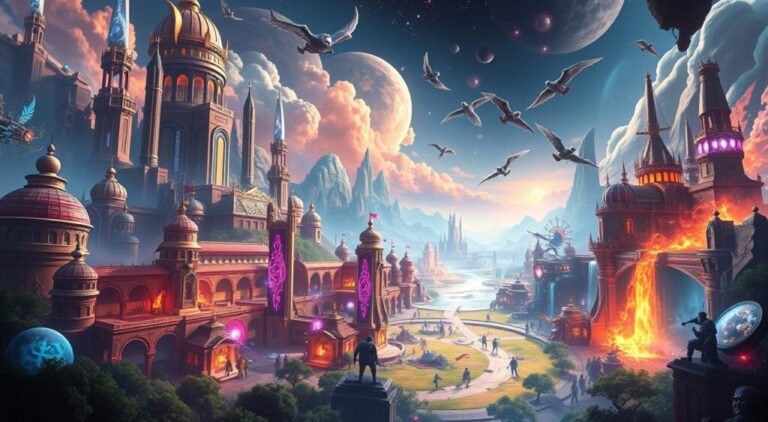
The world of online gaming is a vast and ever-expanding universe, offering a dizzying array of experiences. From epic adventures in fantastical realms to intense competitive battles, there’s a game out there for everyone. This article serves as your comprehensive guide to understanding the diverse landscape of online game genres, helping you navigate the options and find the perfect digital playground for your tastes.
A World of Choices: Why Genre Matters
Understanding game genres is crucial for several reasons:
- Finding Your Niche: Knowing the characteristics of different genres allows you to quickly identify games that align with your preferences, saving you time and potential frustration.
- Communicating Effectively: Using genre terminology helps you communicate with other gamers, discuss games intelligently, and find communities that share your interests.
- Appreciating Game Design: Understanding the conventions and innovations within different genres gives you a deeper appreciation for the art and craft of game development.
The Major Players: Exploring the Genres
Let’s delve into the most popular and influential online game genres:
1. Massively Multiplayer Online Role-Playing Games (MMORPGs):
MMORPGs are defined by their persistent worlds, where thousands of players interact simultaneously. Players create and customize characters, embark on epic quests, explore vast landscapes, and develop their characters’ skills and abilities. Social interaction is a core element, with players forming guilds, collaborating on quests, and participating in in-game economies. Examples include:
- World of Warcraft
- Final Fantasy XIV
- Elder Scrolls Online
- Black Desert Online
2. Multiplayer Online Battle Arenas (MOBAs):
MOBAs pit two teams against each other in strategic combat. Players control powerful heroes with unique abilities and work together to destroy the enemy’s base. Matches are typically fast-paced and require teamwork, communication, and strategic thinking. Key features include:
- Lane-based combat
- Hero progression and customization
- Team-based strategy
- Competitive gameplay
Popular MOBAs include:
- League of Legends
- Dota 2
- Heroes of the Storm

3. First-Person Shooters (FPS):
FPS games immerse players in the action from a first-person perspective. These games emphasize fast-paced combat, requiring quick reflexes, accurate aiming, and strategic movement. FPS games often feature a variety of game modes, from team-based deathmatches to objective-based missions. Examples include:
- Call of Duty
- Counter-Strike: Global Offensive
- Overwatch
- Valorant
4. Real-Time Strategy (RTS):
RTS games challenge players to manage resources, build armies, and strategize to defeat their opponents in real-time. These games require planning, multitasking, and adaptability. Players must balance economic development with military might to achieve victory. Classic RTS games include:
- StarCraft II
- Age of Empires IV
- Company of Heroes
5. Battle Royale:
Battle Royale games pit a large number of players against each other in a shrinking map. Players must scavenge for weapons and supplies, eliminate opponents, and survive to be the last one standing. This genre combines elements of survival games, FPS games, and competitive gameplay. Popular titles include:
- Fortnite
- PlayerUnknown’s Battlegrounds (PUBG)
- Apex Legends
- Call of Duty: Warzone
6. Casual Games:
Casual games are designed to be easy to learn and play, often enjoyed for short bursts of entertainment. These games typically have simple mechanics and are accessible to a wide audience. Examples include:
- Online puzzle games
- Browser-based games
- Mobile games like Candy Crush Saga
7. Simulation Games:
Simulation games aim to replicate real-world activities, from flying airplanes to driving trucks. These games offer a realistic and immersive experience, often appealing to players who are interested in specific activities or professions. Examples include:
- Microsoft Flight Simulator
- Euro Truck Simulator
- Farming Simulator
8. Racing Games:
Racing games put players behind the wheel of various vehicles, competing against each other or against the clock. These games can range from realistic simulations to arcade-style racers. Popular examples include:
- Forza Motorsport
- Gran Turismo
- Need for Speed
9. Sports Games:
Sports games simulate real-world sports, allowing players to compete as their favorite teams or athletes. These games often feature realistic graphics, accurate gameplay mechanics, and online multiplayer modes. Examples include:
- FIFA
- NBA 2K
- Madden NFL
10. Puzzle Games:
Puzzle games challenge players to solve various puzzles, often requiring logic, problem-solving skills, and spatial reasoning. These games can range from simple tile-matching games to complex brain teasers. Examples include:
- Tetris
- Sudoku
- Portal
Beyond the Categories: Hybrid Genres and Innovation
The gaming landscape is constantly evolving, with developers creating new and innovative games that often blend elements from multiple genres. These hybrid genres can create unique and exciting gameplay experiences. For example, some games combine elements of RPGs and FPS games, while others blend strategy and action.
Choosing Your Genre:
When choosing a genre, consider your personal preferences:
- What kind of gameplay do you enjoy? Do you prefer fast-paced action, strategic thinking, or social interaction?
- What platform do you prefer? Some genres are more popular on certain platforms (PC, console, mobile).
- How much time do you have to commit? Some genres require a significant time investment, while others are more suitable for casual play.
Conclusion:
Understanding the different types of online games is essential for navigating the vast world of digital entertainment. By exploring the genres described in this article, you can find the perfect games to suit your tastes and embark on exciting adventures in the world of online gaming. Whether you’re a seasoned gamer or just starting out, there’s a universe of possibilities waiting to be discovered.






